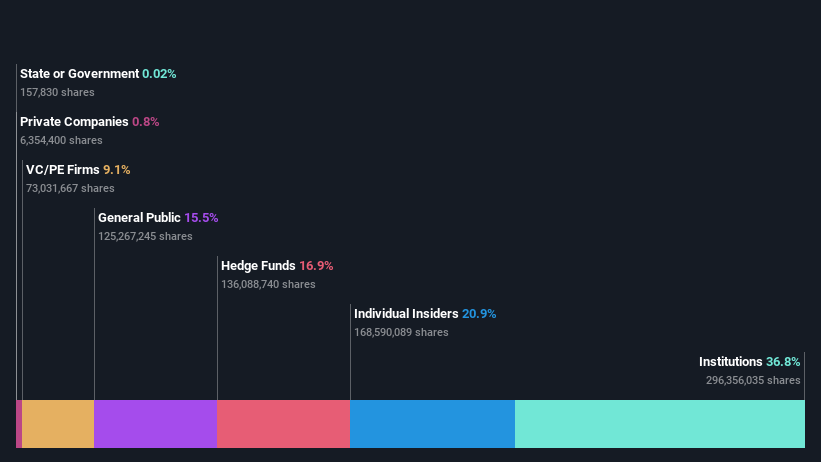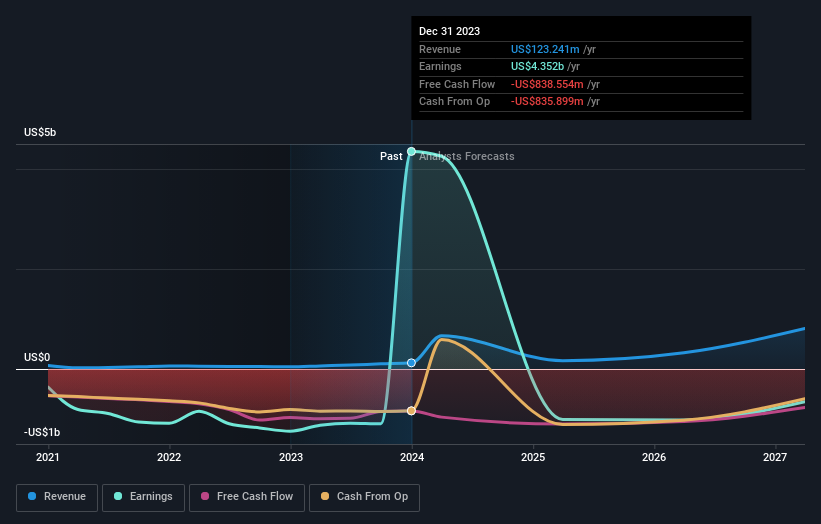Institutional investors are Roivant Sciences Ltd.'s (NASDAQ:ROIV) biggest bettors and were rewarded after last week's US$290m market cap gain
Key Insights
Significantly high institutional ownership implies Roivant Sciences' stock price is sensitive to their trading actions
A total of 7 investors have a majority stake in the company with 52% ownership
If you want to know who really controls Roivant Sciences Ltd. (NASDAQ:ROIV), then you'll have to look at the makeup of its share registry. With 37% stake, institutions possess the maximum shares in the company. Put another way, the group faces the maximum upside potential (or downside risk).
And as as result, institutional investors reaped the most rewards after the company's stock price gained 3.3% last week. The one-year return on investment is currently 32% and last week's gain would have been more than welcomed.
Let's delve deeper into each type of owner of Roivant Sciences, beginning with the chart below.
Check out our latest analysis for Roivant Sciences
What Does The Institutional Ownership Tell Us About Roivant Sciences?
Institutional investors commonly compare their own returns to the returns of a commonly followed index. So they generally do consider buying larger companies that are included in the relevant benchmark index.
We can see that Roivant Sciences does have institutional investors; and they hold a good portion of the company's stock. This can indicate that the company has a certain degree of credibility in the investment community. However, it is best to be wary of relying on the supposed validation that comes with institutional investors. They too, get it wrong sometimes. If multiple institutions change their view on a stock at the same time, you could see the share price drop fast. It's therefore worth looking at Roivant Sciences' earnings history below. Of course, the future is what really matters.
Our data indicates that hedge funds own 17% of Roivant Sciences. That catches my attention because hedge funds sometimes try to influence management, or bring about changes that will create near term value for shareholders. Our data shows that Dan Oren is the largest shareholder with 12% of shares outstanding. In comparison, the second and third largest shareholders hold about 9.1% and 8.6% of the stock.
We also observed that the top 7 shareholders account for more than half of the share register, with a few smaller shareholders to balance the interests of the larger ones to a certain extent.
While studying institutional ownership for a company can add value to your research, it is also a good practice to research analyst recommendations to get a deeper understand of a stock's expected performance. There are a reasonable number of analysts covering the stock, so it might be useful to find out their aggregate view on the future.
Insider Ownership Of Roivant Sciences
The definition of an insider can differ slightly between different countries, but members of the board of directors always count. Management ultimately answers to the board. However, it is not uncommon for managers to be executive board members, especially if they are a founder or the CEO.
Insider ownership is positive when it signals leadership are thinking like the true owners of the company. However, high insider ownership can also give immense power to a small group within the company. This can be negative in some circumstances.
It seems insiders own a significant proportion of Roivant Sciences Ltd.. Insiders own US$1.9b worth of shares in the US$9.2b company. That's quite meaningful. Most would say this shows a good degree of alignment with shareholders, especially in a company of this size. You can click here to see if those insiders have been buying or selling.
General Public Ownership
With a 16% ownership, the general public, mostly comprising of individual investors, have some degree of sway over Roivant Sciences. This size of ownership, while considerable, may not be enough to change company policy if the decision is not in sync with other large shareholders.
Private Equity Ownership
With a stake of 9.1%, private equity firms could influence the Roivant Sciences board. Some might like this, because private equity are sometimes activists who hold management accountable. But other times, private equity is selling out, having taking the company public.
Next Steps:
While it is well worth considering the different groups that own a company, there are other factors that are even more important. To that end, you should learn about the 3 warning signs we've spotted with Roivant Sciences (including 2 which are a bit unpleasant) .
If you are like me, you may want to think about whether this company will grow or shrink. Luckily, you can check this free report showing analyst forecasts for its future.
NB: Figures in this article are calculated using data from the last twelve months, which refer to the 12-month period ending on the last date of the month the financial statement is dated. This may not be consistent with full year annual report figures.
Have feedback on this article? Concerned about the content? Get in touch with us directly. Alternatively, email editorial-team (at) simplywallst.com.
This article by Simply Wall St is general in nature. We provide commentary based on historical data and analyst forecasts only using an unbiased methodology and our articles are not intended to be financial advice. It does not constitute a recommendation to buy or sell any stock, and does not take account of your objectives, or your financial situation. We aim to bring you long-term focused analysis driven by fundamental data. Note that our analysis may not factor in the latest price-sensitive company announcements or qualitative material. Simply Wall St has no position in any stocks mentioned.

 Yahoo Finance
Yahoo Finance 

